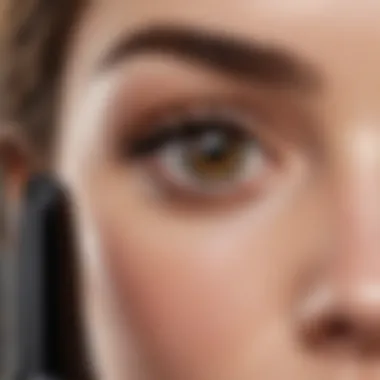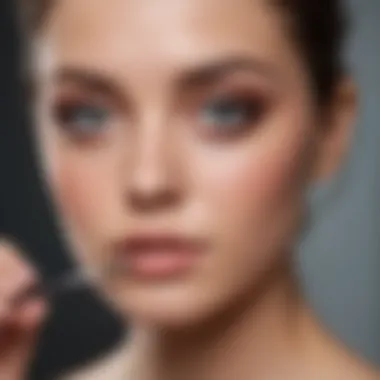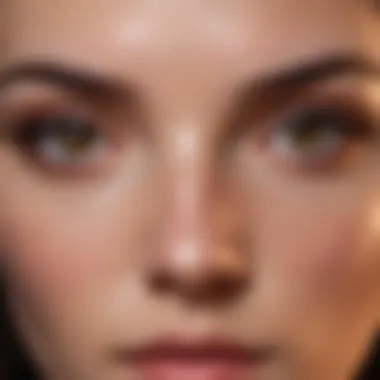Mascara for Allergy Eyes: An In-Depth Exploration


Intro
Choosing the right mascara can be an arduous endeavor, especially for individuals with allergy-prone eyes. Conventional mascaras often contain various irritants that can trigger discomfort and exacerbate allergy symptoms. This article serves as a comprehensive guide, shedding light on the specific challenges faced by those with sensitive eyes and offering insights into suitable alternatives. Through informed choices regarding ingredients, application techniques, and product selection, individuals can enhance their beauty routines while minimizing irritation.
Understanding the skin and eye connection is essential. Sensitive eyes require special attention to ingredients and formulations. Many traditional mascaras may include synthetic dyes, fragrances, and preservatives that can lead to redness, tearing, or itchiness. It is crucial for consumers to recognize the importance of ingredient transparency in their beauty products.
In this article, we will explore the realm of hypoallergenic mascaras, examining the key features that differentiate them from standard options. We will also share practical tips on how to apply and remove mascara effectively, ensuring a comfortable experience. Ultimately, this guide aims to bridge the gap between beauty and health for those navigating sensitive eye care needs.
Preamble to Eye Allergies
Understanding eye allergies is vital for individuals who experience irritation or discomfort. Eye allergies can significantly impact day-to-day life, affecting both comfort and self-esteem. When makeup, particularly mascara, is involved, the stakes get higher. This article examines how allergy-prone individuals can navigate the often-challenging landscape of mascara choices, ensuring they can enjoy beauty without compromising on health.
Understanding Allergic Reactions
Allergic reactions occur when the immune system identifies a substance as harmful. In the context of eye allergies, common triggers include pollen, dust mites, pet dander, and certain beauty products. When the immune system reacts, it releases histamines which lead to inflammation and other symptoms. An understanding of this process is crucial as it informs how one might choose products that minimize potential allergic responses. For instance, knowing the ingredients in mascara can help identify likely allergens.
Common Symptoms of Allergy Eyes
Symptoms of allergy eyes can vary from person to person but often include:
- Itching: A primary symptom, making it hard to concentrate.
- Redness: The eyes may appear bloodshot due to inflammation.
- Watery Eyes: Overproduction of tears occurs as a response to irritation.
- Swelling: The eyelids may become puffed or swollen.
- Blurred Vision: In severe cases, this can happen due to excessive tearing or swelling.
Recognizing these symptoms is essential for anyone considering mascara usage. There can be a delicate balancing act between using products that enhance beauty and avoiding those that may aggravate allergic reactions. Becoming informed about one’s allergies and how they manifest is the first step towards effective management.
The Impact of Makeup on Allergy Eyes
Individuals with allergic reactions in their eyes face unique challenges when selecting makeup products. Makeup serves as a powerful tool for enhancing one's features, but it can also exacerbate the discomfort caused by allergens. Understanding the impact of makeup on allergy eyes is essential for making informed choices about cosmetics, particularly mascara.
The importance of this topic lies in recognizing that not all makeup is created equal. Many conventional products contain irritants that can provoke allergens, leading to redness, itching, and discomfort. Ingredients found in common makeup can trigger reactions, leading to a cycle of irritation that compromises both comfort and beauty. This section will examine specific make-up components that may pose a risk and highlight why mascara is often a significant concern for those with sensitive eyes.
Common Makeup Ingredients That Cause Irritation
There are several ingredients commonly used in makeup that can cause irritation for allergy-prone individuals. Here are some notable ones:
- Parabens: These preservatives are used to extend shelf life, but can lead to skin irritation and allergic reactions.
- Fragrances: Synthetic fragrances are common in makeup and can be highly irritating to sensitive skin.
- Alcohol: Certain alcohols may cause dryness and irritation.
- Colorants: Some pigments used in makeup can cause redness or allergic reactions.
It is crucial for consumers to read labels carefully to avoid these irritants. Many brands now offer formulas designed for sensitive eyes, which eliminates or reduces these problematic ingredients.
Why Mascara Is Particularly Problematic
Mascara presents particular challenges for those with allergy-prone eyes due to close proximity to sensitive tissues. The eyes are among the most delicate areas of the body, so any irritation can create significant discomfort. Specific factors make mascara especially risky for these individuals:
- Formulation: Many mascaras contain ingredients like formaldehyde, which can be irritating. The formulations often include waxes and oils that may not agree with sensitive eyes.
- Application: When applying mascara, the product can easily transfer to the eyes or surrounding skin. This can worsen allergic reactions, especially if the user is not careful during application.
- Sensitivity: Allergic eyes are already reactive, and adding any cosmetic product can intensify symptoms. This makes it vital to choose suitable options.


Understanding these impacts helps allergy-prone individuals make better choices in their makeup routines. Seeking out hypoallergenic options can significantly reduce irritation and increase comfort.
"Ingredient transparency is critical for anyone looking to navigate the complex landscape of allergy-friendly makeup."
In summary, the ramifications of makeup use for individuals with allergy-prone eyes cannot be overstated. By remaining vigilant about ingredients and understanding the inherent risks of specific products, one can find suitable solutions while still enjoying the benefits of makeup.
Choosing Hypoallergenic Mascaras
Selecting the right mascara is vital for individuals with allergy-prone eyes. Hypoallergenic mascaras are specifically formulated to minimize the risk of irritation and allergic reactions. Understanding the various options available can greatly enhance comfort and wearability. This section delves into how to identify hypoallergenic products, the crucial ingredients to seek out, and brands that specialize in these formulations.
Identifying Certified Hypoallergenic Products
Not all mascaras labeled as hypoallergenic are created equally. To choose the right one, look for certifications from recognized organizations. These certifications typically indicate that the product has undergone rigorous testing to confirm its safety for sensitive eyes. Always check for seals of approval from dermatological associations or consumer safety organizations. Moreover, comprehensive ingredient lists should be readily available for these products, ensuring transparency in what you are applying on your eyes. Always rely on established brands that have a reputation for prioritizing their customers' health needs.
Key Ingredients to Look For
In hypoallergenic mascaras, specific ingredients are essential for reducing irritation while providing the desired effects of volume and length. Here are some key components to consider:
- Natural Waxes: Ingredients like beeswax and carnauba wax provide structure without harsh chemicals.
- Gentle Dyes: Opt for mascaras without irritating synthetic dyes. Instead, look for those containing natural pigments, which are often more suitable for sensitive skin.
- Fragrance-Free Formulas: Many individuals have sensitivities to fragrances. Opt for products free from added scents to reduce the likelihood of irritation.
- Vitamins and Conditioners: Formulations that include panthenol or vitamin E can help nourish the lashes while offering moisture, which can soothe irritation.
Brands Specializing in Allergy-Friendly Makeup
Some brands have built their reputation around catering to sensitive skin and allergy-prone individuals. These brands focus on using safe, effective ingredients that minimize potential allergens. Here are a few noteworthy mentions:
- Clinique: Known for its allergy-tested products, Clinique offers a range of mascaras that avoid harsh ingredients.
- Alima Pure: This brand emphasizes natural ingredients and is a favorite among those who value organic formulations.
- Physicians Formula: They specialize in products that are hypoallergenic and suitable for sensitive skin, including a variety of mascaras.
- Too Faced: Known for its 'Better Than Sex' mascara, Too Faced also provides options for sensitive eyes with their hypoallergenic lines.
- Tarte Cosmetics: They create cruelty-free and hypoallergenic makeup, ensuring they cater to the needs of consumers with sensitivities.
The importance of ingredient transparency cannot be overstated. Always research ingredients and choose products that prioritize your comfort and safety.
Application Techniques for Sensitive Eyes
The topic of application techniques for sensitive eyes is crucial in addressing the unique needs of individuals who suffer from allergy-prone eyes. Many makeup products can exacerbate discomfort, so applying mascara correctly can make a significant difference in both comfort and appearance. This section will explore best practices and necessary tools to enhance the mascara-wearing experience for those with sensitivities.
Best Practices for Applying Mascara
When applying mascara, technique is essential. Consider the following best practices:
- Start with Clean Lashes: Begin with clean, dry lashes. Any leftover residues from previous applications can lead to irritation. A gentle cleansing routine helps prepare the lashes.
- Use a Light Hand: Applying mascara with a light touch can minimize discomfort. Pressing too hard can lead to lash loss and irritation.
- Wiggle as You Apply: Instead of a straight stroke, gently wiggle the mascara wand as you apply. This method helps to distribute product evenly while avoiding clumping.
- Apply in Thin Layers: It is often better to build up volume gradually. Thin layers can create an airy appearance without weighing down sensitive lashes.
- Avoid Rubbing: Rubbing or pulling at lashes during application can lead to damage. Use light motions and allow the product to adhere naturally.
Consider these tips to ensure that the experience of wearing mascara is as comfortable as possible while achieving a desired look.
Tools and Products to Enhance Comfort
The right tools can significantly enhance the mascara application experience for sensitive eyes. Here are some recommendations:


- Hypoallergenic Mascara Wands: Some brands offer wands designed specifically for sensitive eyes. These wands are often softer and gentler on the lashes.
- Silicone Brushes: Silicone brushes tend to create less friction than traditional bristle wands. This characteristic can result in much gentler application.
- Eyewash for Irritation: Keeping a gentle eyewash nearby can be helpful. If irritation occurs, a quick wash can provide immediate relief.
"Using products designed for sensitive eyes can change the entire mascara experience, allowing one to enjoy beauty without suffering discomfort."
- Comfortable Eye Makeup Remover: Opt for a gentle, non-irritating eye makeup remover to use after applying mascara. This can make removal easier and less abrasive on sensitive skin.
Mascara Removal Tips
Removing mascara properly is essential for maintaining eye health, especially for those with allergy-prone eyes. Failure to remove mascara effectively can lead to irritation, discomfort, and other allergic reactions. This section will explore the significance of choosing suitable eye makeup removers and employing gentle techniques, which are vital for minimizing adverse effects on sensitive eyes.
Choosing the Right Eye Makeup Remover
Selecting an appropriate eye makeup remover is crucial for anyone dealing with allergies. Many traditional formulas contain harsh chemicals that can exacerbate sensitivity and irritation. Therefore, it is advisable to opt for products specifically designed for sensitive eyes. Look for hypoallergenic formulations without alcohol and fragrances.
Here are some types of removers worth considering:
- Oil-based removers: These effectively break down waterproof mascara while remaining gentle on the skin.
- Micellar water: Known for its mild cleansing properties, this can also remove makeup while hydrating the skin.
- Cream cleansers: These can provide moisture as they dissolve makeup, making them suitable for dry or irritated skin.
Before selecting any remover, conduct a patch test on a small area of your skin to ensure no adverse reaction occurs. Check the ingredient list diligently, aiming for products labeled as non-irritating or suitable for sensitive skin.
Gentle Techniques for Removal
Once the right makeup remover is chosen, the technique of removal is just as important. Rushing the process or using excessive force can lead to stress on the delicate skin around the eyes. Here are some gentle methods to ensure thorough yet careful mascara removal:
- Soak a cotton pad: Dampen a cotton pad with the eye makeup remover, allowing it to sit for a moment on the eyelashes. This helps loosen the mascara without rubbing.
- Wipe gently: Start from the base of the lashes and slowly wipe upwards. Avoid dragging the pad aggressively. Instead, use a light touch in a sweeping motion.
- Use a second pad if necessary: If some mascara remains, repeat the soaking and wiping process with a fresh pad. Never scrub the eyes, as this can cause irritation.
- Rinse thoroughly: After mascara removal, it is good practice to wash your face with a gentle cleanser to remove any remaining product.
Key takeaway: Using the right remover and employing gentle techniques can help maintain the health of your eyes while keeping makeup application enjoyable.
By adhering to these tips, individuals with allergy-prone eyes can enjoy the aesthetics of mascara with reduced risk of irritation or discomfort.
Understanding the Importance of Ingredient Transparency
In the realm of makeup, especially for individuals with allergy-prone eyes, the transparency of ingredients is not only beneficial but essential. Makeup products, particularly mascara, can contain a blend of chemicals that may trigger allergic reactions or irritations. Therefore, understanding what these ingredients are, and how they affect the eyes, is vital for making informed choices.
Ingredient transparency allows consumers to know exactly what they are applying to their skin and eyes. This knowledge empowers users to avoid harmful substances and choose products that are safe and suitable for their unique needs. Furthermore, transparent labels can enhance trust in brands that prioritize health and wellness by offering clear information about their formulations. For those with sensitive skin or eyes, this aspect cannot be overstated.
Many brands now inform consumers about allergens, irritants, and even the source of their ingredients. This is a noteworthy shift from past practices where consumers often had to guess what might be harmful. In addition, an increasing number of cosmetics companies are responding to consumer demand by reformulating products devoid of known irritants. Such actions highlight the industry's evolving landscape towards a more health-conscious approach.
Benefits of Ingredient Transparency
- Reduction in Allergic Reactions: Knowing the ingredients helps avoid products that may provoke allergies.
- Consumer Empowerment: Provides the knowledge necessary to make safe choices.
- Informed Decision-Making: Consumers can compare different products easily.
- Trust and Loyalty: Brands that provide accurate information tend to foster customer loyalty.
Ultimately, ingredient transparency plays a crucial role in the safety and efficacy of cosmetics. For individuals navigating the world of mascara while managing allergy-prone eyes, having clarity on what is inside the product greatly enhances their makeup experience.


Decoding Ingredient Labels
Decoding ingredient labels can sometimes feel overwhelming due to the scientific jargon and chemical names. However, making sense of these labels is necessary for choosing the right mascara. Ingredients are usually listed in descending order based on their predominance in the formula.
To start decoding, look out for:
- Common Allergens: Ingredients like fragrances, parabens, and certain preservatives can induce reactions.
- Label Certifications: Products marked as hypoallergenic or dermatologically tested may offer additional reassurance.
- Natural vs. Synthetic: Understand whether the ingredients are derived from natural sources or synthetics, as the latter may be more likely to cause irritation.
Familiarizing oneself with the most common harmful ingredients can also create more informed consumers. For example, BHT and formaldehyde are known irritants often found in beauty products. Always check for these and similar compounds on the label.
Resources for Product Safety Information
To supplement understanding of ingredient transparency, various resources are available to confirm product safety and suitability:
- Environmental Working Group (EWG): A non-profit organization that maintains a database of personal care product safety ratings. Visit EWG
- Cosmetic Ingredient Review (CIR): Offers detailed reports on the safety of cosmetic ingredients.
- Consumer Product Safety Commission (CPSC): Provides information on product recalls and safety alerts.
In addition to these resources, forums such as Reddit can provide real-world user experiences and product recommendations, creating a community of knowledge where individuals can share insights about mascara choices. Leveraging these resources can lead to better decisions in the delicate realm of makeup for allergy-sensitive users.
Expert Recommendations and Insights
Understanding the perspectives of experts in dermatology and makeup artistry can offer valuable guidance for those grappling with allergy-prone eyes. Knowledge from these professionals can not only mitigate discomfort but also enhance beauty practices tailored for sensitive eyes. Their advice often includes nuanced suggestions that consider both the physiology of the skin and the art of application, ensuring individuals make informed choices about mascara.
Advice from Dermatologists
Dermatologists stress the importance of selecting products specifically designed for allergy sufferers. They recommend looking for certified hypoallergenic mascaras that are tested to minimize skin irritation. Here are some good practices to consider:
- Patch Testing: Always perform a patch test with new products. Apply a small amount of mascara to an inconspicuous area to check for reactions before using it on the lashes.
- Avoid Fragrances: Fragrances can exacerbate allergic reactions, so it is best to choose fragrance-free products.
- Opt for Water-based Formulas: Water-based mascaras tend to be gentler and easier to remove compared to their oil-based counterparts. Dermatologists suggest these, particularly for daily use.
- Monitor Expiration Dates: Using expired products can lead to infections or irritations, so it is essential to keep track of the shelf life of all makeup.
"Hypoallergenic does not always mean a product is free from allergens. Always read the label and consult with a dermatologist if unsure."
In addition, regular consultations with dermatology professionals can help individuals identify any specific allergens that may be affecting them based on their history.
Insights from Makeup Artists
Makeup artists bring a practical perspective to the selection and application of mascara for individuals with allergies. Their hands-on experience allows them to share strategies that improve both safety and appearance. Here are their recommendations:
- Use Primers: Applying a lash primer before mascara can create a barrier that protects the lashes and skin around the eyes. It can also enhance the wear of hypoallergenic mascara, improving performance.
- Application Technique: Many artists advocate for using a light touch during application. Avoiding excessive pulling or tugging reduces the chance of irritation. Apply mascara with a gentle wiggle to coat lashes without undue stress.
- Regularly Clean Tools: Keep mascara wands clean to prevent bacteria build-up. Use a clean brush instead of the wand provided with the mascara for application whenever possible.
- Know When to Stop: If eyes feel uncomfortable after applying mascara, makeup artists recommend removing it immediately. Ignoring discomfort can lead to greater sensitivity or allergic reactions.
Incorporating insights from both dermatologists and makeup artists creates a comprehensive approach to managing beauty routines for allergy-prone individuals. By following expert recommendations, one can navigate the complex landscape of mascara choices more effectively.
Culmination: Striking a Balance between Beauty and Comfort
In the pursuit of beauty, particularly in the realm of eye makeup, individuals with allergy-prone eyes face unique challenges. This article highlights the necessity of balancing aesthetics with comfort, recognizing that mascara can profoundly impact not only one's appearance but also one's quality of life. Understanding the specific irritants prevalent in many conventional mascaras is vital. Choosing products that cater to sensitive eyes is not merely a matter of convenience, but an essential consideration for maintaining eye health.
The role of hypoallergenic mascaras cannot be overstated. These products often exclude harmful ingredients that are prone to cause allergic reactions, thereby reducing discomfort for the wearer. The beauty industry has slowly begun adapting to the needs of consumers with allergies. As a result, the market for allergy-friendly beauty products continues to expand, offering a growing selection of safer alternatives.
"It's about more than just looking good; it's about feeling good too."
To achieve this balance, consumers are increasingly prioritizing ingredient transparency. Being able to decode ingredient labels equips individuals with the knowledge needed to make informed choices that align with their skin's needs. This conscious decision-making empowers users to select products that enhance their beauty without compromising their comfort.
Moreover, expert insights from dermatologists and makeup artists underline the importance of proper application and removal techniques. These practices can significantly mitigate irritation, allowing individuals to enjoy makeup without the adverse effects often associated with traditional products. The evolution of application tools tailored for sensitive eyes further aids in this endeavor.







